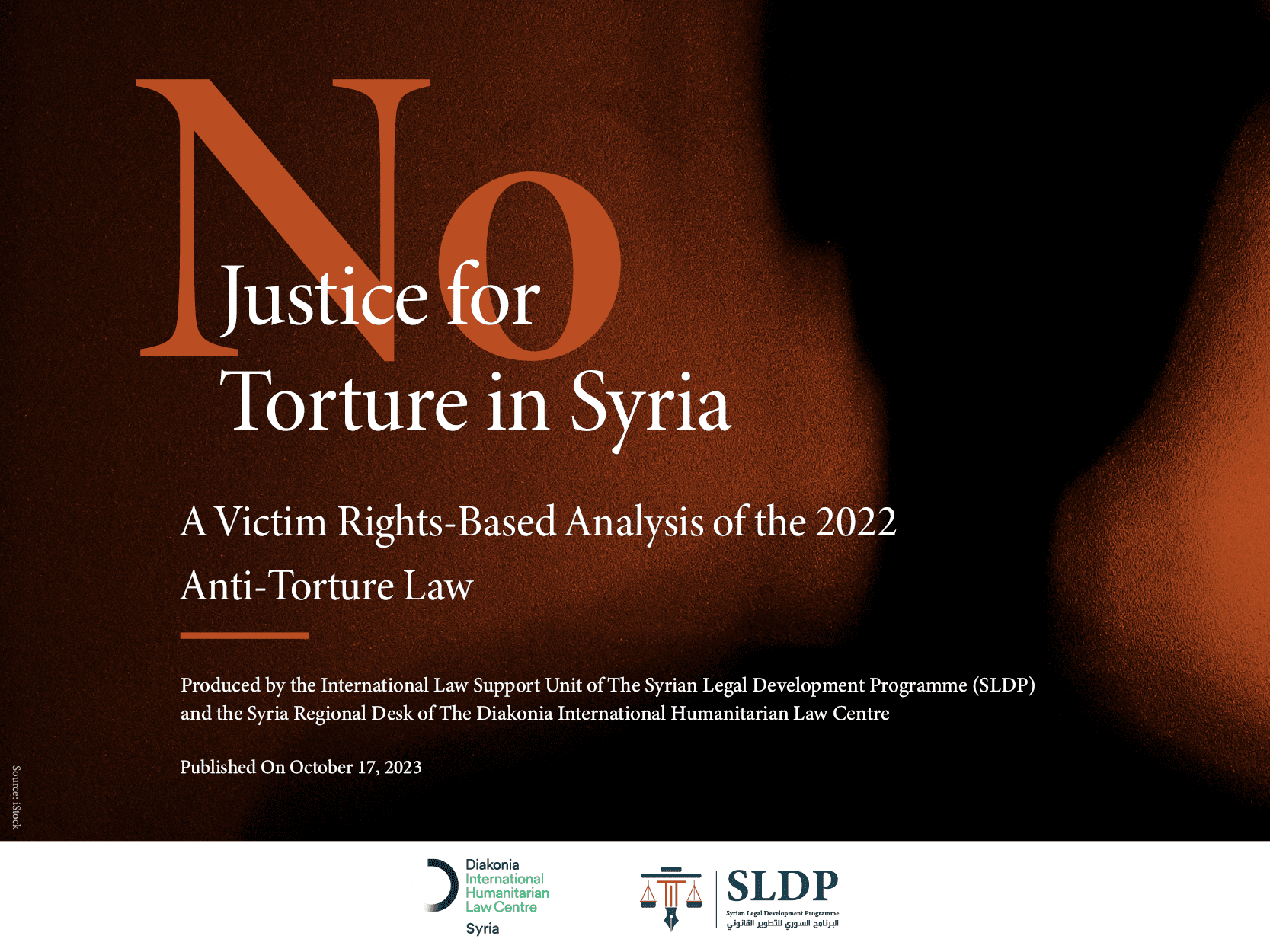Nov 2, 2023 | | Download as PDF | This post is also available in: Arabic

Produced by the International Law Support Unit of The Syrian Legal Development Programme (SLDP) and the Syria Regional Desk of The Diakonia International Humanitarian Law Centre
Published On October 17, 2023
In January 2022, the Koblenz Higher Regional Court held that the Syrian authorities have systematically perpetrated torture and cruel, inhuman, or degrading treatment or punishment (ill-treatment) in detention centres.(1) Since the uprising in 2011 and the subsequent armed conflict, the Independent International Commission of Inquiry on the Syrian Arabic Republic (COI) has extensively documented the use of torture by the Syrian authorities, particularly the intelligence and security agencies, against civilians, including political opponents and human rights defenders. The COI has also documented the use of torture and ill-treatment by non-State armed groups (NSAGs), such as the Free Syrian Army, the Syrian National Syrian Army, the Syrian Democratic Forces, Hay’at Tahrir al-Sham, and the Islamic State of Iraq and the Levant.
State agents responsible have persistently evaded justice, benefiting from structural and legislative obstacles to impartial and independent investigations that have institutionalised impunity. Acts of torture and ill-treatment by NSAGs have also not been investigated or prosecuted. This violates the State’s obligation to investigate allegations of serious violations of International Human Rights Law (IHRL) and International Humanitarian Law (IHL), to prosecute suspected perpetrators, and to provide effective remedies for victims. Consequently, victims and survivors of torture and ill-treatment have been abandoned with no access to remedy, reparations, or recognition of their harm and experiences.
The Syrian authorities have consistently denied allegations of torture and ill-treatment, claiming that detainees are treated humanely and that torture is a crime adequately punishable by law. The Syrian authorities have also alleged that the Convention against Torture (CAT) is part of its domestic legislation and takes precedence over national laws in case of conflict. Yet, despite the Syrian authorities’ claim that domestic laws were already adequate to criminalise torture, they enacted the Anti-Torture Law of 29 March 2022 (hereinafter anti-torture law). While the new law imposes stricter penalties and could be seen as a positive step towards comprehensively criminalising torture in Syria, it cannot be read in isolation from other laws in force, particularly those granting immunity to State agents.
This paper analyses the Syrian authorities’ failure to fulfil its obligations under international law despite the adoption of the new anti-torture law. The paper argues that the new anti-torture law fails to:
– ensure the absolute prohibition of torture and other cruel, inhuman, or degrading treatment or punishment as required by IHRL, IHL, and Syria’s obligations under the CAT.
– explicitly criminalise cruel, inhuman, or degrading treatment or punishment as stipulated by the CAT, therefore obstructing the recognition of victims of ill-treatment as such before the law and their subsequent access to remedy and justice.
– address enforced disappearance as a form of torture, therefore failing to recognise the specific impact of enforced disappearance on Syrian families and provide redress to victims of enforced disappearance and their families.
– end the impunity enjoyed by members of the Syrian Military and its Intelligence, Internal Security Forces, and the General Intelligence Directorate, therefore violating victims’ right to an investigation and access to judicial remedy.
– provide full and effective redress and reparation for torture victims, including restitution, compensation, rehabilitation, satisfaction and right to the truth, and guarantees of non-repetition.
This paper argues that victims of torture and ill-treatment in Syria will continue to face significant obstacles in pursuing justice and redress in spite of the new anti-torture law. The question of the retroactive application of the law to past allegations of torture raises concerns about shielding perpetrators with further immunity as well as about the adequacy of the law itself to prosecute for those crimes and to redress the victims. Furthermore, the imposition of stricter penalties alone is insufficient to address the systematic use of torture in Syria. More comprehensive measures are needed to address past violations, tackle the root causes of torture, hold perpetrators accountable, provide redress and reparation to victims, and guarantee non-repetition. The new anti-torture law fails to address these critical issues, treating torture as an exception rather than a widespread and systematic policy in Syria.
(1) Koblenz Higher Regional Court, Life imprisonment due to crimes committed against humanity and murder – sentencing of a suspected member of the Syrian secret service (17 January 2022) (Available at: https://olgko.justiz.rlp.de/presse-aktuelles/detail/life-imprisonment-due-to-crimes-committed-against-humanity-and-murder-sentencing-of-a-suspected-member-of-the-syrian-secret-service).


